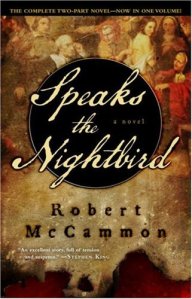
Photo by Paola Ramirez. Postcards from nowhere in particular (I). via.
“My voice is near its end, but this I have to tell you,” he whispered. “There was once a merchant. An eager, industrious young man. His business… required him to rise early and thus to bed early. But one evening… he stayed awake past his usual hour… and in so doing he heard the wondrous singing of something he’d never heard before: a nightbird. The next night, he managed to stay awake later… to hear more of the bird’s song. And, the following night. He became so… so intoxicated with the nightbird’s voice that he thought only of it during the day. Came the time when he spent all the night listening to that song. Could not carry out his business during the sunlit hours. Soon he turned his back altogether on the day, and gave himself over to the nightbird’s beautiful voice… much to the sad end of his career, his health… eventually his life.”
“A fine parable,” Matthew said curtly. “Is there a point to it?”
“You know its point. A parable, yes, but there’s great truth and warning in it.” He gave Matthew a piercing stare. “It is not enough to love the nightbird’s song. One must also love the nightbird. And… one must eventually fall in love with the night itself.”
 I’m surprised Robert McCammon isn’t talked about more in same breath as Stephen King, that he isn’t a more treasured part of our horror fiction landscape. After being simultaneously entranced and repelled by his apocalyptic fiction novel Swan Song, I wanted more. McCammon’s Speaks the Nightbird isn’t my normal pick of thriller, as it takes place in the harsh and wild landscape of Carolina in 1699, an as yet unsettled America looming in from all sides. Sometimes historical fiction bogs me down with its language, but the plot here held promise. An enterprising businessman has settled the town of Fount Royal further down the coast than the already established Charles Town. Into this struggling settlement, magistrate Isaac Woodward and his clerk Matthew Corbett arrive, summoned to put on trial a supposed witch. While the townspeople eagerly blame all their woes on the woman they call a witch, the young clerk Matthew Corbett, protagonist, refuses to believe such a simple but fantastical explanation, and investigates the various eccentricities of Fount Royal’s small citizenry.
I’m surprised Robert McCammon isn’t talked about more in same breath as Stephen King, that he isn’t a more treasured part of our horror fiction landscape. After being simultaneously entranced and repelled by his apocalyptic fiction novel Swan Song, I wanted more. McCammon’s Speaks the Nightbird isn’t my normal pick of thriller, as it takes place in the harsh and wild landscape of Carolina in 1699, an as yet unsettled America looming in from all sides. Sometimes historical fiction bogs me down with its language, but the plot here held promise. An enterprising businessman has settled the town of Fount Royal further down the coast than the already established Charles Town. Into this struggling settlement, magistrate Isaac Woodward and his clerk Matthew Corbett arrive, summoned to put on trial a supposed witch. While the townspeople eagerly blame all their woes on the woman they call a witch, the young clerk Matthew Corbett, protagonist, refuses to believe such a simple but fantastical explanation, and investigates the various eccentricities of Fount Royal’s small citizenry.
The beauty of McCammon’s work, both here and in Swan Song, is his refusal to neglect any aspect of the story. Speaks the Nightbird begins with the magistrate and clerk’s journey into Fount Royal, and their disastrous attempt to stay overnight at an inn on the way. Many novels wouldn’t open with such bold, unpleasant scenes, but McCammon isn’t one to shy away from the grittier aspects of human nature. The reader’s discomfort grows right along with that of the clerk, Corbett: “He could feel the raw tension in the air between them, as nasty as the pinewood smoke.”
McCammon’s love of detail and willingness to walk the reader through each frightful scene step by step, ensuring that we stay with these characters every agonizing moment of their struggles is what makes his work great, but for me, some of the gore bordered on unreadable. Speaks the Nightbird contains some gut-wrenching descriptions of 17th century medicine, and one incredibly repelling barn scene between a man and his horse. Swan Song wades even further into the darkest depths of human nature, with unflinching descriptions of humanity trying to survive after nuclear attack. Is this pleasant reading? No. Is it powerful, and scary in a slow, smart way? Absolutely.
Speaks the Nightbird by Robert McCammon on Amazon.com/Indiebound.org
Swan Song by Robert McCammon on Amazon.com/Indiebound.org
Further reading:
- 7 Audioworthy Apocalypses (kalireads.com)
- Matthew Corbett’s World: The Historical Fiction Series by Robert McCammon (matthewcorbettsworld.com)
- Interview: Robert McCammon (nightmare-magazine.com)